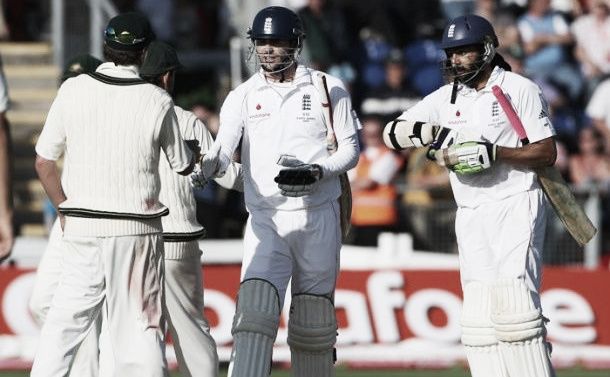The first Ashes test between England and Australia starts on Wednesday 8th July, the match taking place at the Swalec Stadium, Cardiff - the scene of one of England’s greatest escapes in 2009. As with this year, the match at Cardiff was the first test, and that series could have been very different if England hadn’t snatched the draw.
England went into this Ashes series looking to regain the urn after suffering a five-nil defeat last time out down under. England, though, had famously won the previous series at home in 2005. England still had some of the heroes of 2005, in Andrew Strauss, who was by then the captain, Andrew ‘Freddie’ Flintoff and Kevin Pietersen.
The Swalec Stadium is the home ground of Glamorgan and has been an international venue since May 1999, when it played host to a World Cup game between Australia and New Zealand. The ground wouldn’t host its first England game until 2006, when they played Pakistan in a one-day international.
The 2009 match was the first test match to be played at the ground, making England’s 100th test match venue. The ground was originally known as Sophia Gardens but renamed the Swalec Stadium in 2008 after Glamorgan agreed a 10 year sponsorship deal with electricity supplier Swalec.
England win the toss and bat
England captain Strauss won the first coin toss of the series, and elected to bat first. His side stumbled to 90/3 in the 25th over before a partnership of 138 between Pietersen and Paul Collingwood saw the Three Lions recover until they both fell in quick succession, seeing England reduced to 241/5. England ended the first day of the match on 336/7 after Peter Siddle picked up two quick wickets towards the end of the day.
The second day started with Graeme Swann firing 47 off 40 balls as England were eventually all out for 435 shortly before lunch, the Australian openers having to face eight overs before the interval. Australia only lost one wicket in the rest of the day's play as Ricky Ponting and Simon Katich built a steady partnership; by the end of the second day, both men had reached their centuries. In the process of reaching his hundred, Ponting also went past the milestone of 11,000 test runs.
England fought back at the start of the third day, picking up three early wickets, with James Anderson picking up the wickets of Katich and Michael Hussey, Ponting followed shortly after but Australia consolidated their position and reached 458/4. Play after the tea break was delayed for two hours by rain, after which Australia reached the close of play on the third day with a lead of 44 and still five first innings wickets in hand.
Play on the fourth day started on time despite the threat of rain, Australian batsmen continuing to punish the English bowlers with Marcus North reaching his century on Ashes debut. Ponting finally declared the Australian first innings on 674/6, leaving England staring defeat in the face.
Anderson and Panesar the heroes
England started their second innings shorty before tea on the fourth day, 239 runs adrift of the Australians, meaning they had a battle on their hands just to rescue a draw. They had a disastrous start, losing the wickets of Alastair Cook and Ravi Bopara before the tea break to leave them 20/2. During the tea break, the rain came, and thankfully for England there was no more play on the fourth day. This meant that they went into the last day 219 runs adrift with eight wickets in hand.
England continued to lose wickets in the morning's play, losing a further three wickets in the first 90 minutes of the day and struggling their way to lunch on 102/5. Collingwood dug himself a trench at the crease, barely playing a shot in anger, his main objective being not to give his wicket away. Collingwood batted for five hours, scoring just 75 runs and facing 245 balls. Flintoff, Stuart Broad and Swann all stuck around with Collingwood, batting for well over an hour each.
Collingwood was the ninth man out, with England still five runs adrift, and it was left to the last man partnership of Anderson and Monty Panesar to edge their side into the lead and bat out the remaining overs. England batted until 6.40pm on the final day to secure the draw, reaching 252/9 in their second innings. Strauss' men celebrated what looked like an unlikely draw, especially seeing as they had lost their first five wickets by lunchtime on the final day.









































